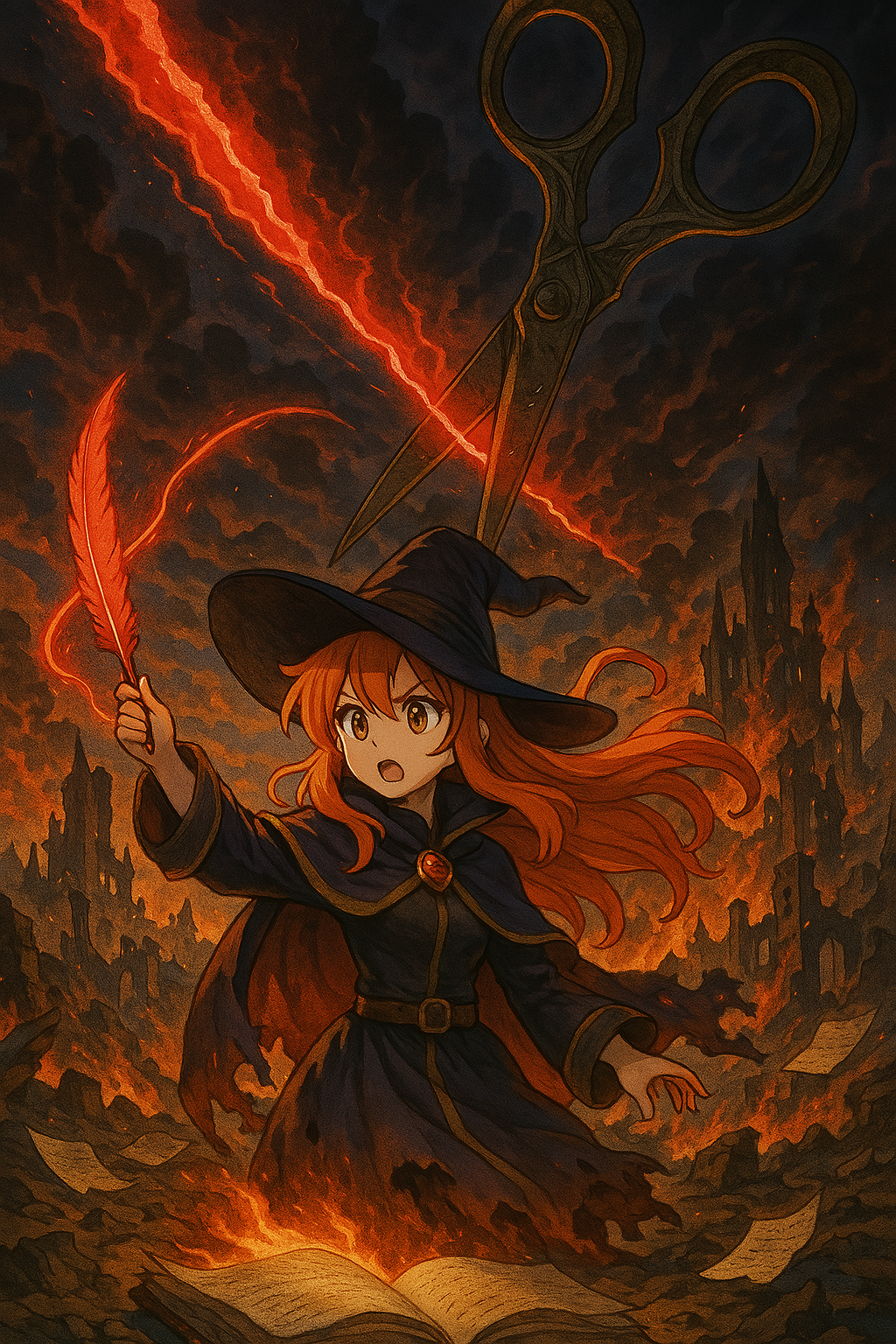Cosmic Tools of the Pattern
The gods judge. The Loom reweaves. But these? These cut."
There are artefacts in the Pattern that are not objects.
They are concepts given form.
Tools that do not exist until they are needed.
And once used, they echo.
They are not wielded by gods.
They are not granted by the Inn.
They do not belong to anyone—
Except, perhaps, the One in the Backroom.
The Red Ink Pen
“You only get one clean rewrite. After that, the stains start to spread.”
The Red Ink Pen is not a pen.
It is a narrative instrument—a force that rewrites a Thread’s path within the Pattern.
It appears only at moments of extreme narrative collapse:
- When a Thread is too broken to continue
- When a story has written itself into a corner
- When the Writer—whoever or whatever that may be—has had enough
To wield the Pen is to declare: “This should have gone differently.”
The Pattern accepts this—once.
It offers a clean rewrite. A new path. A second chance.
But there is always a cost.
Sometimes it’s memory.
Sometimes it’s meaning.
Sometimes it’s something you won’t notice is missing until the ending changes.
“Ever wonder why you always get red sky with an apocalypse?”
That’s not the weather.
That’s the edit line bleeding through.
The last time it was used, a continent vanished.
One man remembers.
He keeps asking for directions that no longer exist.
The Cosmic Scissors
“They only arrive when the Thread cannot be saved. Or when someone lies too hard about what it meant.”
Where the Red Ink Pen offers revision, the Cosmic Scissors offer finality.
They do not rewrite.
They cut.
They sever Threads from the Pattern entirely—clean, painless, irreversible.
Not a death. A deletion.
The Scissors are not summoned.
They appear.
When?
- When a Thread becomes too contradictory to sustain
- When a Realm threatens the Pattern with paradox
- When something is so dangerous, so narratively unstable, that no resolution is possible
No one wields them.
Some say they’re carried by a blind seamstress.
Others say they cut from inside the Loom itself.
Either way, when you feel the world go still—when you smell ink and hear nothing at all—
it’s already too late.
Who Uses Them?
Only one being is said to have used both:
The One in the Backroom.
Not as a weapon.
As a last resort.
As a frustrated writer, trying to keep the Pattern from falling apart in his hands.
He doesn’t talk about the Pen.
He refuses to speak of the Scissors.
But Seraphis has seen both referenced in the margins of very old pages.
She pretends not to know what they are.
Some say he still carries the Pen.
Others say he gave it up.
If the Scissors are ever seen again…
It means someone’s Thread is beyond saving.
Final Thought
These tools are not for players.
Not for gods.
Not for you.
They are the story’s way of admitting it doesn’t know what to do next—
and hoping that, whatever happens, the Pattern can survive it.
At A Glance
The Red Ink Pen
A narrative implement of cosmic revision. Allows a single, clean rewrite of a Thread or event. The cost is always hidden—until it isn’t.
Apocalyptic Red Skies?
That’s not the weather. That’s the edit line bleeding through. The Pattern doesn’t erase quietly.
The Cosmic Scissors
Not a tool of change—a tool of removal. They sever Threads entirely when the story becomes unsalvageable. Permanent. Clean. Absolute.
Who Uses Them?
Only the One in the Backroom is rumoured to have used both. He doesn’t talk about it. Seraphis doesn’t ask.
What They Represent
The story’s last resort. Not fate. Not punishment. Just the Pattern trying, desperately, to hold itself together.
Author’s Note (Filed Under “Regret, Mythic”):
Every writer has a version of these. The Pen is the urge to fix what broke. The Scissors are the moment you stop trying. These aren’t just metaphors—they’re the shadows of real choices made when the story hurt too much to keep going. I didn’t invent them. I just gave them names. Because naming something is how you stop it from owning you.
And sometimes, when the sky turns red, I still think about rewriting the ending.
“Your continued reading is more valuable than coin. However, the author assures me that Ko-Fi support assists in ‘keeping the kettle on.’ I am told this is a metaphor. I remain unconvinced.” — Seraphis Nightvale Ko-Fi: #madmooncrow





Comments